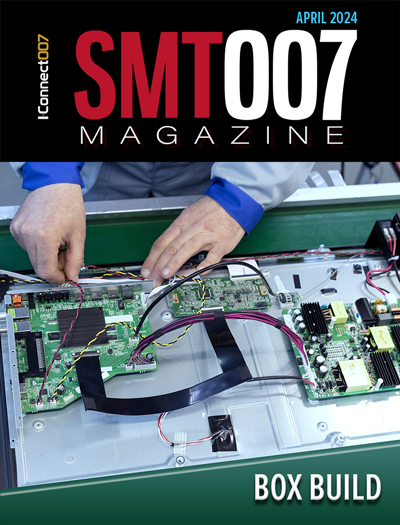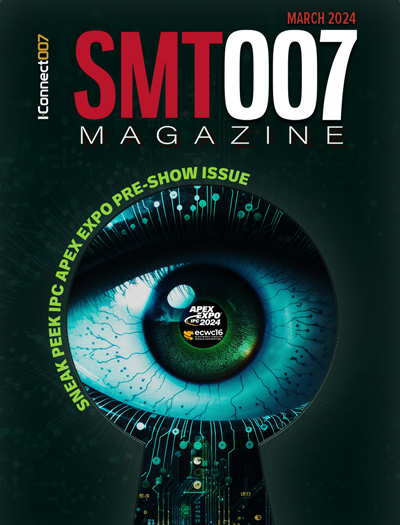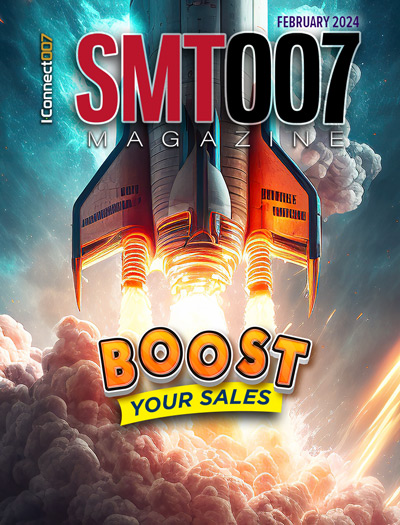-

- News
- Books
Featured Books
- smt007 Magazine
Latest Issues
Current Issue
Box Build
One trend is to add box build and final assembly to your product offering. In this issue, we explore the opportunities and risks of adding system assembly to your service portfolio.

IPC APEX EXPO 2024 Pre-show
This month’s issue devotes its pages to a comprehensive preview of the IPC APEX EXPO 2024 event. Whether your role is technical or business, if you're new-to-the-industry or seasoned veteran, you'll find value throughout this program.

Boost Your Sales
Every part of your business can be evaluated as a process, including your sales funnel. Optimizing your selling process requires a coordinated effort between marketing and sales. In this issue, industry experts in marketing and sales offer their best advice on how to boost your sales efforts.
- Articles
- Columns
Search Console
- Links
- Events
||| MENU - smt007 Magazine
Zentech’s John Vaughan on the Mil/Aero Sector: “It’s Headed Up”
April 9, 2015 | Barry Matties, I-Connect007Estimated reading time: 6 minutes
I-Connect007 Publisher Barry Matties and Zentech’s John Vaughan had a chance to discuss industry concerns within the mil/aero segment at IPC APEX EXPO 2015. The two also shared thoughts on the space industry, and Vaughan detailed Zentech’s involvement with National Manufacturing Day, a nationwide effort focused on STEM (Science, Technology, Engineering and Math) that simultaneously brought high school students together with 1,600 manufacturing companies from around the U.S.
Barry Matties: John, let's start by having you tell me a little bit about Zentech.
John Vaughan: Zentech Manufacturing, Inc. is an electronics contract manufacturer and contract engineering services business based in Baltimore, Maryland. We’re privately held, and in addition to operating three SMT lines, we have box build capabilities, and we’re highly certified; in fact, we're the second facility in the United States that was certified to the IPC Trusted Source QML Class 3 program, and Zentech was the very first certified to IPC J Standard 001 for space processing. We also hold AS9100 certification for the aerospace sector, and medical ISO 13485.
Matties: What's your position at Zentech?
Vaughan: I’m vice president of sales and marketing. I transitioned to direct with Zentech back in October after five years representing their business interests in the military C4ISR sector. The primary goal in my going direct is to build-out the Zentech brand nationally and we have gotten excellent traction in that respect over the past two quarters.
Matties: And how long have you been in the industry?
Vaughan: Well, I’ve been in the industry for all of my life, literally. My father and some partners constructed a contract manufacturing operation, Airtronics, in 1964 in Northern Virginia, outside of Dulles Airport, supporting the U.S. Air Force and Navy radar manufacturing. As a young man, I grew up in the business and learned technology manufacturing from the ground up, processing sheet metal, building printed circuit boards and manufacturing cable and wire assemblies, the whole deal. Though it has changed ownership several times through the years (Automata, DDi), proudly, the facility still stands and is still operational today building advanced technology circuit boards as Viasystems - Sterling.
Matties: Now you're in Washington, DC, right?
Vaughan: Zentech itself is in Baltimore, Maryland, and I reside outside of Washington, DC, in Fairfax, Virginia. As you know, it’s a large and combined metropolitan area with a very target rich mil/aero environment – given that 20+ of the military primes have their headquarters in the region to ensure their proximity to the Pentagon.
Matties: So from your point of view, obviously you have a lot of insight into the military segment of this industry, how do you see the condition of the mil /aero industry, and where do you see it heading?Page 1 of 2
Suggested Items
SEMI Applauds U.S. Chips Act Award for Samsung Electronics Facilities to Strengthen Domestic Semiconductor Supply Chain
04/17/2024 | SEMISEMI, the industry association serving the global electronics design and manufacturing supply chain, applauded the United States Department of Commerce’s announcement of a Preliminary Memorandum of Terms for an award under the CHIPS and Science Act to support the expansion of Samsung Electronics’ presence in Texas and the company’s development and production of leading-edge chips.
Ark Electronics Expands Global Manufacturing Factory Network in North America and Europe
04/17/2024 | PRNewswireElectronic Manufacturing Company Ark Electronics recently announced the expansion of its Global Factory Network with the addition of Electronics Manufacturing Service (EMS) capabilities in Mexico and Europe.
SIA Applauds CHIPS Act Incentives for Samsung Manufacturing Projects in Texas
04/16/2024 | SIAThe Semiconductor Industry Association (SIA) released the following statement from SIA President and CEO John Neuffer applauding semiconductor manufacturing incentives announced by the U.S. Department of Commerce and Samsung.
Report Reveals ‘True Impact’ of Manufacturing is Nearly a Quarter of UK GDP
04/15/2024 | Manufacturing Technologies AssociationManufacturing is having a far greater impact on the UK economy than first thought according to a major new report released today.
Design Community Town Hall Review
04/11/2024 | Kelly Dack, CID+, EPTACThe Design Community Town Hall took place on the afternoon of April 10, 2024. I was fortunate to attend this event, which marked an opportunity for members of some newly found design groups to get together and exchange ideas. Peter Tranitz, senior director of solutions for IPC, opened the session with a slide presentation introducing these new groups and members within the solutions department.


